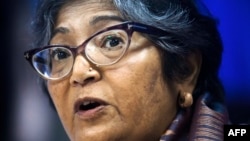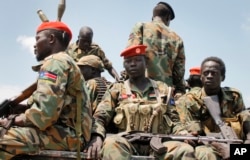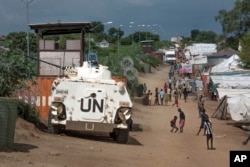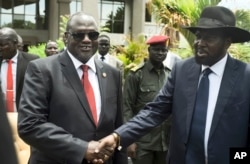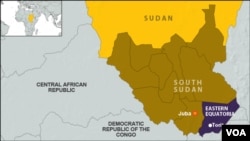A U.N. human rights monitor says "ethnic cleansing" is under way in parts of South Sudan, and warns the country is on the brink of a genocide.
Yasmin Sooka heads a U.N. Human Rights Council team that just finished a 10-day visit to South Sudan. In a statement Thursday, she said people are being displaced from their homes through a process of starvation, gang rape and the burning of villages.
"Everywhere we went across this country we heard villagers saying they are ready to shed blood to get their land back. Many told us it's already reached a point of no return," Sooka said.
She added, "The stage is being set for a repeat of what happened in Rwanda and the international community is under an obligation to prevent it."
'Unfounded' accusations
South Sudan's deputy minister of information, Akol Paul Kordit, called the accusations "unfounded." He told VOA's South Sudan in Focus program Thursday that the government is working with the opposition SPLA-IO in the unity government to implement a peace deal the sides signed last year.
"And therefore, there is no way we can prepare an offensive against our own partner in the transitional government of national unity," he said.
Rights groups and aid agencies have repeatedly sounded the alarm about South Sudan, where an armed conflict largely along ethnic lines has killed tens of thousands and displaced more than 2.5 million people.
Hundreds of thousands of people are sheltering in camps protected by United Nations peacekeepers.
Political situation
The war was triggered by fighting between supporters of President Salva Kiir and his rival, Riek Machar, in December 2013. Last year's peace deal largely broke down after renewed fighting in the capital, Juba, this past July.
Machar fled the country and called for continued war against President Kiir, while another opposition faction has remained in the government.
Earlier this week, the United States said it has "credible information" that South Sudan's government is targeting civilians in Central Equatoria state and is preparing for "large-scale" attacks, possibly within days.
The U.S. ambassador to the Human Rights Council, Keith Harper, told the U.N. body that the South Sudanese government has mobilized at least 4,000 militia members and "is staging the fighters in Equatoria to begin conducting attacks."
The U.S. is currently pushing the U.N. Security Council to impose an arms embargo on South Sudan.
Sooka, a human rights lawyer from South Africa, led a three-person team that visited parts of Unity, Upper Nile, Western Bahr el Ghazal and Central and Eastern Equatoria states during the U.N. fact-finding mission, which ended Wednesday.
Sooka said she was especially disturbed by the prevalence of rape across the country. "The scale of rape of women and girls perpetrated by all armed groups in South Sudan is utterly unacceptable and is frankly mind-boggling," she said.




